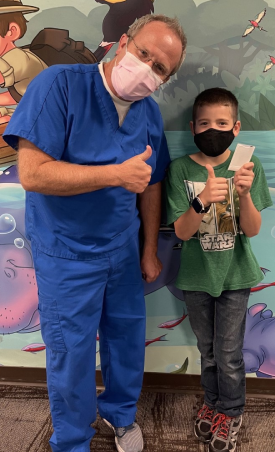When it comes to your baby’s dental health, the term “tooth eruption cyst” may seem alarming. However, rest assured, this common condition is typically harmless and temporary. In this blog, we will explore what a tooth eruption cyst is, how it develops, and what you need to know as a parent when it occurs. From eruption cyst baby symptoms to treatment options for different age groups, we’ve got you covered with all the essential details.
What is a Tooth Eruption Cyst?
A tooth eruption cyst is a fluid-filled swelling that can form when a tooth is emerging through the gums. The cyst usually appears as a bluish lump, and it happens when fluid accumulates between the developing tooth and the gum tissue. This condition can affect both primary (baby) teeth and permanent teeth. The eruption cyst baby typically occurs in infants as their first teeth begin to emerge, often seen in the area where the primary molars are coming in. For older children, an eruption cyst may appear as permanent teeth begin to emerge.Causes of a Tooth Eruption Cyst
The exact cause of a tooth eruption cyst is not fully understood. However, it is thought to be linked to the eruption process of teeth. As a tooth begins to push through the gums, fluid may accumulate in the soft tissues around it, forming a cyst. This condition can affect babies, as well as older children. When it comes to a eruption cyst 1 year old, the cyst typically occurs during the emergence of the baby’s molars, though it can happen at any time during teething.Common Symptoms of a Tooth Eruption Cyst
For most babies, a tooth eruption cyst is not painful, though in some cases, your child may experience mild discomfort. The main symptom is the visible presence of a lump on the gum where the tooth is trying to emerge. The cyst often appears as a soft, bluish bump. For an eruption cyst 1 year old, parents may notice the swelling as the first molars start to erupt. Despite its appearance, the eruption cyst baby is typically painless and doesn’t cause significant issues.How Long Does a Tooth Eruption Cyst Last?
The good news is that tooth eruption cysts are generally temporary. Most of the time, the cyst will resolve on its own as the tooth erupts. If you notice an eruption cyst baby, it should clear up by the time the tooth emerges through the gum, typically within a few weeks to a couple of months. In older children, the same rule applies for eruption cyst 7 year old cases when the permanent teeth start to emerge.Eruption Cyst Baby: When Should You Seek Treatment?
Typically, eruption cysts are self-limiting, meaning they resolve without the need for intervention. However, if the cyst becomes infected, grows larger, or causes discomfort, it might require eruption cyst treatment. In most cases, eruption cyst treatment is simple and may involve warm saltwater rinses or, in rare instances, the drainage of the cyst. If your baby is showing signs of infection or severe pain, it’s best to consult a pediatric dentist for advice.Eruption Cyst vs Dentigerous Cyst: What’s the Difference?
It’s important for parents to understand the difference between a tooth eruption cyst and a dentigerous cyst. Both involve the eruption of teeth, but a dentigerous cyst is a more serious condition. A dentigerous cyst is often associated with permanent teeth and can grow larger over time. In contrast, a tooth eruption cyst is typically a benign, harmless condition. Eruption cysts generally don’t require surgery and are easily treated with minor intervention if needed.Eruption Cyst Permanent Tooth: What Happens When They Occur?
When a tooth eruption cyst appears as a permanent tooth begins to emerge, it’s typically not a cause for concern. An eruption cyst permanent tooth happens when fluid accumulates around the tooth that is pushing through the gums. The cyst usually resolves on its own once the tooth emerges fully. For eruption cyst 7 year old children, this typically occurs as the first permanent molars or incisors are coming in. While it can be unsettling to see, rest assured that it usually resolves without complications.How is an Eruption Cyst Diagnosed?
Diagnosing a tooth eruption cyst is relatively straightforward. Pediatric dentists will often perform a visual examination of your child’s gums to check for the characteristic blue or purple lump. In most cases, no further tests are required, though an X-ray may be performed if the dentist wants to assess the eruption of the tooth beneath the cyst. If you suspect an eruption cyst baby, it’s always a good idea to consult with a dentist to confirm the diagnosis and discuss your child’s dental health.Eruption Cyst 1 Year Old: What Should Parents Expect?
If you notice an eruption cyst 1 year old, you are likely seeing the first signs of your baby’s molars pushing through the gums. This is a normal part of the teething process, and while it can be alarming at first, the cyst will usually go away once the tooth emerges. As long as the cyst doesn’t cause significant pain or swelling, there is no need for concern. Regular monitoring and good oral hygiene are essential during this time.When Should You Seek Professional Care for an Eruption Cyst?
While most eruption cysts do not require medical treatment, there are certain situations in which professional care is necessary. If the cyst becomes infected, appears unusually large, or is causing significant discomfort, it’s important to seek advice from a pediatric dentist. An eruption cyst permanent tooth may sometimes require more extensive care if there are complications. Early intervention can help prevent any potential issues and ensure your child’s teeth erupt smoothly.FAQs About Eruption Cysts
-
Can an eruption cyst affect my baby’s permanent teeth?
Yes, an eruption cyst permanent tooth can occur when the permanent teeth begin to emerge. However, these cysts usually resolve without any lasting effects. -
How long does an eruption cyst last in a baby?
For an eruption cyst baby, the cyst typically lasts until the tooth fully erupts, which can take a few weeks to a few months. -
How can I treat an eruption cyst baby?
In most cases, eruption cyst treatment isn’t necessary. However, if there is swelling or infection, consult a pediatric dentist for possible drainage or other care.



